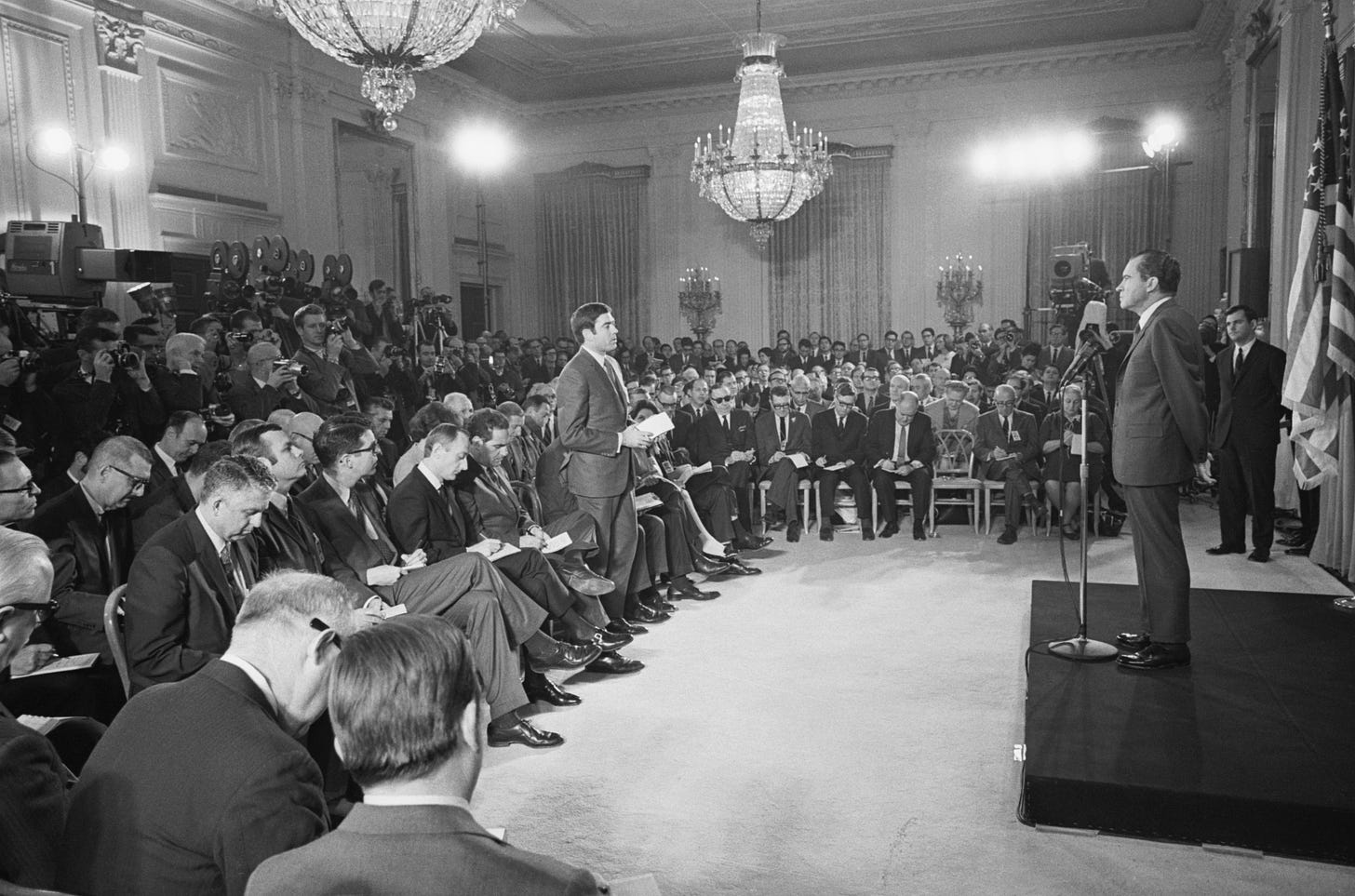I have always marveled at the work of acoustical engineers. This is not to say I even begin to understand what they do, let alone the mathematics behind it. But the notion that you can balance the vibrations of sound, bring out the clarity of a sole oboe in a concert hall, separate a voice from a noisy background, well, it is downright mysterious and enchanting to me. I tend to be a visual person. My own hearing was harmed by proximity to artillery in Vietnam and further diminished with the passage of time. But I understand the power of sound, and how that power can be muddied by cacophony.
I bring up this rumination today because I see in it a parallel for a perilous moment for our nation’s press. How do we, as a profession, find the signals of truth amidst the noise of disinformation and propaganda? How do we modulate the varying inputs so we don’t end up directing an orchestra of false equivalence? How do we allow for moments of silence and reflection without the hum of the mechanical room of daily life intruding unnecessarily?
The record of the press over the last several years has been mixed, to put it mildly, and I do not exempt myself from this criticism. It was worse in the run-up to the 2016 election and in the early years of the Trump presidency, although there were many notable exceptions of reporters and journalistic endeavors that were very clear-eyed in portraying the danger of a mendacious, would-be autocrat assuming the most powerful job in the world. As the presidency wore on, the press as a whole became less timid about calling a lie, a lie. And by the end, with the blatant attempt to overthrow a free and fair election, and then an insurrectionist mob storming the Capitol, most in the press were able to state clearly what was going on without resorting to the polite innuendo that tilts the scales towards normalizing the truly dangerous.
But even as we have seen one trendline among the so-called “mainstream” press, there is of course an alternate universe of powerful media properties with a pecuniary and power-hungry interest in promoting the big lies. They are very different kinds of acoustical engineers. Rather than amplifying clarity, they engage in sonic warfare with the truth.
Even in the best of times, the role of the press will, and perhaps should, be raucous. One of the ideas behind the First Amendment is that we need to have a rambunctious and unconstrained Fourth Estate, that it’s better to have too many voices than too few. Our new media technologies exacerbate a sense of chaos in the modern press. Not only are there unconfirmed rumors and outright lies flying about, but for the working journalist the digital deadlines are no longer measured in days or even hours, but by the minute or even nanosecond. Such a system doesn’t encourage introspection or restraint. And into this void, bots engineered to sow division and purveyors of information warfare find fertile ground.
I don’t want to bog this particular note down too much in a general discussion of the state of the press. Many have written about it at great length and with greater insight than I can provide. I laid out my own general thoughts in the chapter on “The Press” in our book What Unites Us. No, the real question I want to address here is how should the press proceed in the unique circumstances of the moment.
Let’s start by stating some facts.
We have a departed president whose actions put this nation in the gravest internal threat since the Civil War. He will go down in history as a villain to democracy and the truth. He may very well face criminal prosecution on any number of fronts and he may yet be convicted in a second impeachment trial in the Senate. If this was all about Trump, the job of the press would not be that difficult. He is easy to cover now that the verdict of his tenure is so clear. He’s a liar, a cheat, an autocrat, a sower of division and discord, and an incompetent in facing down the gravest public health crisis in a century. It’s a pretty simple narrative.
But here’s the rub. There is a lot more to Trumpism than Trump. He leaves behind a party and a political movement shaped by his basest instincts. In many ways he amplified dangerous currents that have always coursed through this nation: racial hatred, anti-intellectualism, nativism, corruption, and selfishness. His would-be successors, his enablers and abettors, many of whom remain in places of powerful political and media perches, seem unchained and bereft of any instinct for self-reflection. They are eager to dismiss the deadly disaster they helped create and find ways to undermine the current president, who commanded 81 million votes, and won resoundingly in both the popular vote and the Electoral College.
Journalists need to be on to this story. Mitch McConnell in particular is up to his old tricks. He made a Faustian bargain with Trump that gave Republicans control of the judiciary and big corporate giveaways. Now he is walking his way through the post-Trump era without any apparent sense of shame or reckoning with how close this nation came to democratic implosion, and the role he and his caucus played in the dance with demagoguery.
All this is true, and yet the role of the press is to be a check on government. Government is now run by a Democratic administration with majorities in both houses of Congress, McConnell’s mischief-making in the Senate notwithstanding. The Cabinet posts are Democrats. America’s foreign policy will be run by Democrats. And that requires a press to drill down and investigate, to ask difficult questions. Pull no punches. Play no favorites, as a favorite saying of mine goes. We do not benefit as a nation when government officials are not held accountable. This is the way the system is supposed to work.
This brings me back to my metaphor of acoustical engineers. How do we balance out all the noise? How do we fine tune our journalistic enterprises so that our readers and viewers get a full picture and not a distorted one? How do we not get stretched by the lies on one side so that we wallow in a dangerous middle ground of false equivalence?
It’s a lot easier to ask these questions than find answers. We are operating in an ecosystem of disinformation, fanned by new powerful and unaccountable information-spreading technologies - the full impact of which we have yet to reckon with, or even understand. We have lucrative business models in media built on the howls of misplaced victimhood. And we can never forget that as we go back to covering Congress and what was once a natural order of things, we have real bad faith actors, including members of the legislative bodies, who tried to overthrow an election.
As we cover the current administration, we have to remember that we have just made it through arguably the most corrupt administration in U.S. history. This corruption was encouraged with sycophancy and cowardice by a group that now wants to claim that a mantle of unity means kowtowing to their demands. How do we make sense of all of this? There is no moment in modern history that offers any particular guide.
This will be, or at least should be, on ongoing discussion within press rooms and with the society at large. At this early time, I offer some general guidelines to both the press and the public, expecting my own views to evolve over time.
To the Press:
Context, context, context - don’t cover the stories of the moment without putting it into the broader perspective. If there is an ethics question about a member of the Biden Presidency, don’t ignore the ethics violations that just occurred in the previous administration. Try to find the proper yardstick for comparison.
Don’t elevate the trivial - there are news stories and there are stories seeking clicks. The Biden administration might be boring compared to the last one. There might be a temptation to prove that the press isn’t in the tank. If you are considering publishing something trivial that could then lead to breathless bloviating on Fox News, please think first.
Remember that President Biden garnered 81 million votes. When we talk about “real America,” it’s certainly not only rural diners, it’s also diverse, urban immigrant neighborhoods. It’s Native American communities. It’s college campuses. In trying to figure out what Americans care about, remember the country of 2021, not 1951.
Bring in more diverse reporters - A country this diverse demands a press corps just as diverse. We need people who see the world differently.
Get out of the office - it’s hard in a pandemic, but when things settle down in particular, get outside, onto the streets and into the field. Find stories about topics, and not only about politics.
Don’t allow the powerful to scare you. Remember that when well done, journalism is noble work.
And, by all means, let’s don’t take ourselves too seriously: take the work seriously, but not ourselves.
To the Public:
Hold the press accountable - if you think we are distorting the truth, falling into false equivalence, or promoting the trivial at the expense of the importance, let us know. Reactionaries in this country have weaponized outrage. That needs to be balanced by those who value the truth.
At the same time, be a bit understanding - journalism is at best a crude art form. We will be imperfect. We will get things wrong. The hope is to get as close to the truth as humanly possible.
Promote, share, and support quality reporting - Journalism is an occupation. And it costs money to report, especially deep digging investigations and foreign coverage. If you find a publication you like and have the means, please subscribe and share with others.
All of these ideas are not new, have been better outlined by others, and by themselves will not solve our current challenges with journalism, its strained business models, and the technological revolutions that have destabilized media enterprises. But we need to start somewhere.
President Biden deserves great scrutiny. But that can’t overshadow the forces that seek to remove American democracy, disenfranchise voters, and encourage corruption. New administrations usher in new eras, to be sure. But the stories from the past don’t suddenly end, only to reappear at the next election.
Stay focused. Stay fair. Stay honest. Stay steady.
—Dan







Nice piece, Dan. From a rather liberal Canadian point of view it's difficult to see how this will work out. I am hoping that the story of FOX news will some day be told as a cautionary tale as to how dangerous and expensive it can be to repeat lies. Confirmation bias is no way to conduct journalism.
As always Mr. Rather - well said. And so needed in this time of cacophony. Finding the truth can be difficult, bringing it to light can be harder, but just going for ratings as has been done in the recent past cannot be the pattern for real journalism. I remember the days gone by when I could see who picked up the National Inquirer at the newsstand - it was funny, but some took it seriously. Far too many take the crackpot conspiracy theories seriously and have gone down that rabbit hole - never to return. Keep speaking out my friend - many many of us are listening.